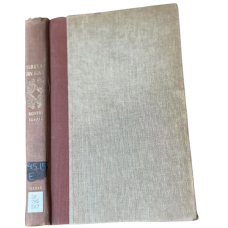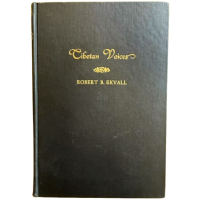The book offers a vivid account of life among Tibetan nomads in the 1930s. Ekvall, a Christian missionary who spent years living in the region, shares his observations and experiences in a collection of essays that paint a detailed picture of Tibetan culture, social customs, and religious practices. He provides insights into their unique way of life, including elements of daily routines, interactions, and challenges faced by these nomadic communities. The book delves into a range of topics, from banditry and feuds to spirituality and morality. Through Ekvall's personal anecdotes and observations, the reader gains an understanding of the Tibetan people and their world. It's a valuable resource for anyone interested in Tibetan history and culture, as seen through the eyes of someone who lived among them. The narrative offers a window into a fascinating and relatively untouched corner of the world.
1952, Farrar, Straus and Young, New York. Ex library, with usual marks and pockets, spine faded, board edge wears, binding tight.
About the Author
Robert B. Ekvall was born in Gansu, China, to American missionaries and grew up on the Tibetan frontier. Fluent in Chinese and deeply familiar with Central Asian cultures, he returned to China in the 1920s as a missionary and educator. His early work among Tibetan nomads later informed his ethnographic writings.
During World War II, Ekvall and his son were interned by the Japanese in Southeast Asia. After a prisoner exchange in 1943, he joined the U.S. Army at the urging of General Joseph Stilwell. As a Chinese-speaking captain, he served in the Burma campaign, acting as interpreter and liaison between Chinese and American forces, and later helped coordinate intelligence efforts in wartime Chongqing.
In 1945, Ekvall was wounded during a mission in Lanzhou and soon after lost his son in a military accident—a blow that marked him deeply. Postwar, he served under General George Marshall’s mission in Beijing and later as assistant military attaché, traveling across western China.
Ekvall’s second marriage, to Hungarian-Swedish linguist Eva Kunfi in the late 1940s, produced two children, Erik (b. ~1950) and Karen (b. ~1956). Settling in Seattle, he chaired the University of Washington’s Inner Asia Research Project, curated Asian ethnology at the Burke Museum, and authored seminal studies such as Fields on the Hoof: Nexus of Tibetan Nomadic Pastoralism (1968) and the memoir Faithful Echo (1960). His scholarship combined rigorous field observation with empathy for Tibetan pastoral life, influencing a generation of Central-Asianists.
Robert Brainerd Ekvall died in May 1983. Soldier, missionary, linguist, and anthropologist, he navigated the upheavals of twentieth-century Asia with a rare ability to interpret cultures as adroitly as he translated languages—earning a place among the most versatile “China Hands” of his era.
| Book Details | |
| Author | Robert B. Ekvall |
| Publisher | Farrar, Straus and Cudahy, New York |
| Publication Date | 1952 |
| Format | Hardcover |
| Dimensions | 15*22 |
| Pages | 240 |
| Language | English |
| Condition | Ex library, with usual marks and pockets, spine faded, board edge wears, binding tight. |
Tibetan Sky Lines, by Robert B. Ekvall
- Publisher: Farrar, Straus and Cudahy
- ISBN: 195204
- Availability: In Stock
-
US$25.00
Related Products
Tibetan Voices, by Robert B. Ekvall
This group of poems has recorded f rus both the mystery and humanity of the pople of Tibet. The 14 m..
US$25.00


-74x74.png)

